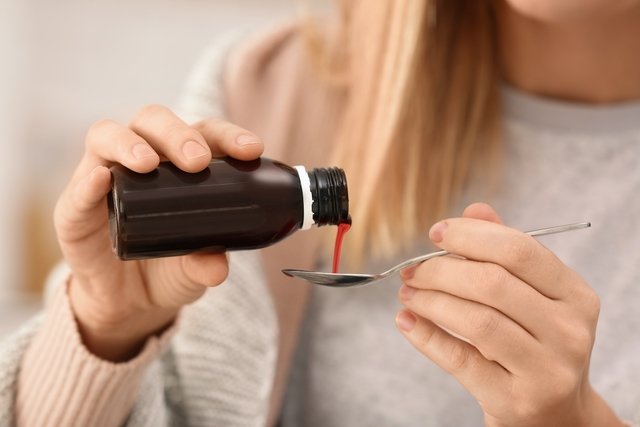Levodropropizine is an antitussive indicated for the treatment of dry and irritating cough, caused by bronchitis, laryngitis, infections or allergies of the respiratory tract, as it acts by inhibiting the cough reflex, relaxing the bronchial muscles and improving pulmonary ventilation.
This medicine can be found in pharmacies or drugstores in the form of a syrup containing 30 mg/5mL of levodropropizine or 30 mg/mL drops, with the trade names Percof or Antux, for example.
Levodropropizine can be used by adults or children over 2 years of age, as long as it is medically indicated, as it can cause side effects such as heart palpitations, abdominal pain, drowsiness or muscle weakness.
What is it for
Levodropropizine is indicated for the treatment of dry, irritating, phlegm-free cough caused by:
- Bronchitis;
- Tracheitis;
- Laryngitis;
- Respiratory tract infections or allergies.
This medicine works by reducing the excitation of receptors in the tracheobronchial tree and thus blocking the transmission of nerve impulses to the cough center in the brain, inhibiting the cough reflex.
Furthermore, levodropropizine helps relax the bronchial muscles and improves pulmonary ventilation.
Levodropropizine should be used with the advice of a pulmonologist or pediatrician, who can indicate individual doses and treatment time, according to the condition to be treated.
Make an appointment with a pulmonologist in the nearest region:
Taking care of your health has never been easier!
Is Levodropropizine anti-allergic?
Levodropropizine is not an antiallergic and does not have any anti-allergenic substance in its composition.
However, despite not being an antihistamine drug, this remedy reduces bronchial spasms caused by histamine, promoting relaxation of bronchial smooth muscles, helping to relieve allergic coughs. Check out the main syrups for allergic coughs.
How to drink
Levodropropizine syrup or drops should be taken orally, between meals, at times established by the doctor.
The dosage of levodropropizine varies according to age and presentation of the medicine, which includes:
1. Levodropropizina xarope 6 mg/mL
Doses of 6 mg/mL (30 mg/5mL) levodropropizine syrup vary with age and include:
- Adults or children over 12 years old: 10 mL of syrup, up to 3 times a day, with at least 6 hours between doses;
- Children aged 2 to 12: the dose is 1 mg for each kg of body weight, up to 3 times a day, that is, the maximum dose should not exceed 3 mg/kg of body weight per day.
Levodropropizine doses must be measured using the measuring cup provided in the packaging.
The length of treatment with levodropropizine syrup must be guided by the doctor, and if there is no improvement in the cough after 4 to 5 days of treatment or other symptoms appear, you should consult a doctor. See other cough syrups that your doctor may recommend.
2. Levodropropizine 30 mg/mL
The doses of the oral solution in drops of levodropropizine 30 mg/mL for children over 2 years of age are 1 mg for each kg of body weight, up to 3 times a day. The maximum daily dose should not exceed 3 mg/kg of body weight per day, or 120 drops.
Levodropropizine drops can be diluted in a little water to make them easier to take.
Treatment with levodropropizine drops for children over 2 years old must be guided by the pediatrician, as well as the calculation of doses.
Possible side effects
The most common side effects of levodropropizine are heart palpitation, vomiting, diarrhea, abdominal pain, excessive tiredness, weakness, lack of energy or drowsiness.
In addition, other less common side effects may also occur, such as chest pain or discomfort, headache, dizziness, a feeling of drowsiness, redness in the eyes or rash cutaneous. Know how to identify the symptoms of rash cutaneous.
Is Levodropropizine safe?
Levodropropizine makes you sleepy, drowsiness being one of the common side effects of this medicine.
Therefore, caution should be taken or avoid activities such as driving, using heavy machinery or carrying out dangerous activities during treatment with levodropropizine.
Who shouldn’t use
Levodropropizine should not be used by children under 2 years of age, pregnant or breastfeeding women, or by people who are allergic to this medicine or any other component of the formula.
Furthermore, this remedy should be used with caution by people who have severe renal or hepatic insufficiency, bronchial hypersecretion, decreased motility of bronchial cilia.
Levodropropizine should also be avoided by people using medications such as benzodiazepines, phenytoin or imipramine, as it may increase the side effect of drowsiness.
Levodropropizine syrup contains sucrose, so it should be used with caution in diabetic people.

Sign up for our newsletter and stay up to date with exclusive news
that can transform your routine!
Warning: Undefined array key "title" in /home/storelat/public_html/wp-content/plugins/link-whisper-premium/templates/frontend/related-posts.php on line 12
Warning: Undefined array key "title_tag" in /home/storelat/public_html/wp-content/plugins/link-whisper-premium/templates/frontend/related-posts.php on line 13




